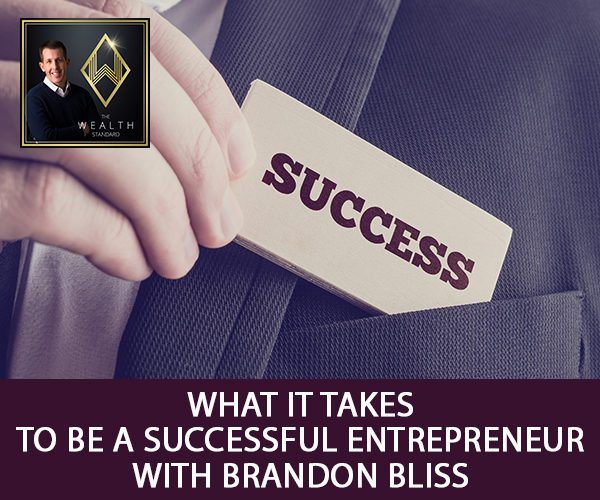What It Takes To Be A Successful Entrepreneur with Brandon Bliss
Podcast: Play in new window | Download
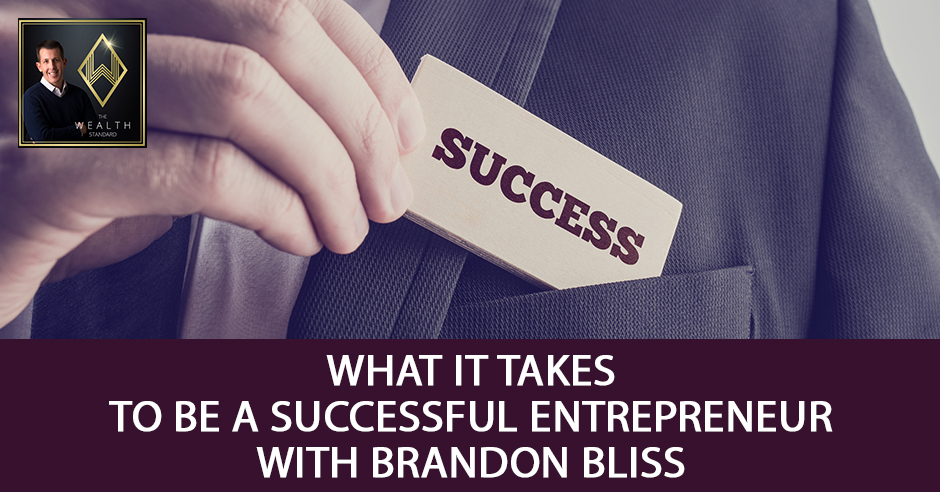
—
Watch the episode here:
Listen to the podcast here:
What It Takes To Be A Successful Entrepreneur with Brandon Bliss
Thank you for reading this episode. You are going to get a kick out of this. First, I wanted to say how thankful I am for the response that I’ve received based on the kickoff episode. Hearing from all of you has inspired me a great deal. I’ve heard transformation stories of those who had realizations and an impact based on, “Things I listened to on the show,” that changed their life. Opportunities for business, for investment and for changing the way they manage their finances, it’s been incredible to hear those. I start to incorporate some of the ideas that have come from these interactions.
Thank you so much. Keep them coming. Leave reviews on iTunes. That is helpful because it gets the word out. Email me. For now, use the Patrick@PatrickDonohoe.com. I’ll try my best to respond to you directly. As far as feedback is concerned, it’s what your experiences have been, what you have liked, what you would like to see more of. That simple feedback means a great deal to me. I’m going to change a few things because of it. First thing, I’m going to try to do some more feedback based on my opinion of the subject matter, as well as the guest and why I have this specific guest on and also some commentary around financial strategy. There are a lot of you who enjoyed the Financial Fridays that we did last season, although we did not do them every week. There was a lot of feedback in regards to the content there. Thank you for pointing that out. I’m humbled by all of you who are taking what has changed my life and those who I know as clients. It means the world to me to know that you have taken action on certain principles and certain strategies and taking them to heart and done something about it. Thank you from the bottom of my heart.
Let me get to the guest. He’s the CEO of Orbit Medical. Brandon is someone I grew up with in Central Connecticut. I’ve known him since my childhood. I consider him one of my best friends. He has inspired me over the years. He is exemplary of this idea of our theme this season, which is entrepreneurship. Brandon has gone through a lot in his business career. It’s indicative of what happens through overcoming obstacles and facing challenges. Within business and entrepreneurship, you’re going to face the gamut, regardless of what industry it is. This is the medical industry. Specifically, medical supplies is a highly regulated industry. Oftentimes, you deal with things that are completely out of the blue.
Brandon and his passion and desire to achieve and also receive that sense of fulfillment that comes from achievement is going to be the perfect guest. We’ll probably tell some jokes and some childhood stories and probably memories that he doesn’t want to relive or maybe I don’t either. We had some great times growing up. We have kept in touch. He lives close to me now. It’s going to be awesome for you to see maybe a different side of me, but also talk to somebody that I have a great deal of respect for, that has inspired me probably more than he realizes. Let’s talk to my good friend who’s the CEO of Orbit Medical, Brandon Bliss.
—
For this episode, we’re talking about entrepreneurs and entrepreneurship. I always say I have special guests, but this guy is a special guest. Brandon is the CEO of Orbit Medical. Brandon and I grew up together in Central Connecticut. The reason why I wanted to have Brandon on the show is that I’ve had tremendous admiration for him for a long time, starting when I was young. Our friendship over the years has evolved in business, has provided an outlet for me to talk about my business, the challenges that I face and ideas. Brandon is a wealth of information. He has also experienced a lot of success in business and the challenges that most businesses face. We had a conversation about like, “I got to this level. How did you get to this level?”
Everybody wants to be with whoever's winning. Click To TweetOur parents were entrepreneurs. Our parents didn’t tell us to do this. Yet, we wound up in this situation. Us seeing each other grow up and the experiences that we had together growing up, and seeing where we’re at now are cool to reflect on. We’re going to do a little bit of that to begin, and then get into his business background and talk about what he has seen in the marketplace as far as successful entrepreneurs and what makes a successful entrepreneur. First off, I know you don’t do podcasts. I try to make it so we’re having one of our normal discussions.
I’m terrified, but I’m happy to get this one under my belt. Thanks for having me.
Thanks for coming on. Let’s start maybe along the lines of the discussion we had. Our parents weren’t entrepreneurial. We grew up in a normal, lower middle-class set of circumstances. We both chose different careers. You’re in the medical field of finance. Yet at the same time, we decided to do our own thing or at least wound up doing our own thing. As you look back, how have you pieced it together? What are some of the things that made you want to do that and why you’re doing what you’re doing now?
I’m not exactly sure why I’m wired the way I am, but it goes back even to childhood where my buddies were lifeguards, my buddies were flipping burgers and I was like, “I’m not doing that. I’m going to make way more money, open my own landscaping company, work half the time and outsource the work to my brothers or other buddies.” I’ve always not done well working for other people. I prefer to be in charge. I’m wired that way. I’ve always gravitated to that. Even out of college, I studied Finance at the University of Utah. I took a job in sales. One of my buddies recruited us. I had a lot of success. I quickly became one of the top salespeople. They started throwing equity at me so I wouldn’t leave. I got a taste of owning businesses as opposed to working for other people. Once you’d get a taste of that, it’s hard to go back. I would do everything I could to get additional equity and buy out people or take advantage of circumstances so that I had more upside. That’s what I’ve been doing. Along that whole way, I diversified as quickly as I can and started trying to get equity in other businesses and get the money working for me.
One thing that I connected, which is a similarity of us, is you are successful in football. You played football for a couple of years and looking at hockey. Sometimes the drive to excel and succeed and win translates into other areas of life. You’ve always had that characteristic. Business and excelling and succeeding come with its challenges and failures as well. It’s proportional in some cases. How has that tenacity and that drive that we experienced, maybe in sports, played into that?

Successful Entrepreneur: Once you’d get a taste of owning businesses as opposed to working for other people, it’s hard to go back.
It crosses over well. If you’re going to compete at the higher levels of any sport, you have to have an edge. You have to be super competitive and you want to win. You hate losing. If you can translate that, you bring that into your business, compete at that level and make your competitors nervous about going up against you. You keep your foot on the gas the whole time, innovating and finding better ways to compete. Usually, the outcomes are positive. You capture market share and you retain talent. Everybody wants to be with whoever’s winning. That has served me well here. I was much more successful in high school in sports than I ever was in college. I tried hard. The time you have to put in, the dedication, the hard days, the pain you feel, all that stuff will help you take the punches when you start businesses or you’re trying to get companies to the next level. Sports will set you up. There are many setbacks in sports. There are many injuries or disappointments or heavy hard losses that you’re going to experience in that business. You’re going to fail. You’re going to get punched. You’re going to have three snakes coming at you at once. You’ve got to maneuver through it and be tough and not give up. If you’re tough, you win sometimes.
With businesses, you’ve had more experiences here. When I see success in somebody, an entrepreneur or a business or an investor or someone who’s successful in general, you tend to have two camps. You tend to have those that have only experienced success. You have those that have experienced a proportional amount of hardship. What I’ve seen from that point going forward, the failures I tend to see are those that have experienced lots of success, get punched in the face and don’t know how to react. As you’ve looked at other businesses and as you’ve been involved with your own and employees in general, where have you seen that dynamic?
It reminds me of that E-Myth book where everybody wants to have some success but works for someone else, and thinks they can duplicate it and do it elsewhere. There are a few experiences in my life where I’ve seen people go down that path and crash and burn and I think about why that happened. It’s easy to read books and maybe watch other people do things. If that individual, that CEO, that founder can’t surround himself with the right people, if he can’t execute on the plan and get enough cashflow coming in to survive until he can figure out exactly how to compete, most of the time it doesn’t work. That’s why many businesses fail. The number of people that can execute on that are few and far between. There are a lot of people with big ideas and can work in a big organization and contribute and do well. To take risks and the punches and to go off and do it on your own and then execute, if you haven’t done it or you haven’t been part of someone that’s done it and you’re right there, it’s hard.
You look at these tech startups. I’m involved with some of them. I’ve put money into them. This is my tuition in this world. I’m not successful in investing. These are your subscription-based tech companies that are doing rounds of funding and trying to hit it big. Has that founder done it himself? Can he raise the capital? Can he execute? Can he hit the different milestones that they need to get the scale so that someone will acquire them? That’s hard. Most will never ever do it. I learned that the hard way. I learned that in the process of investing in them. It can be applied to all different businesses. People may even have passion, but if they cannot connect the dots, if they don’t have those dynamic chameleon-like social skills to be able to put it all together until the cashflow stabilizes, it doesn’t work.
From a people perspective, since we’re young, you couldn’t work for other people. That’s oftentimes the cause of people going out on their own. They can’t work for this person. They can’t work for that person. Talk about your experience with understanding people. An entrepreneur that goes out on his own, that can’t work with other people is another big red flag. Even though you can’t work for a boss per se, how have you seen the ability for successful entrepreneurs as it relates to the relationships and communication and having people that are part of their organization?
If people are interested in your opinion, they'll ask. Otherwise, you shouldn't offer your counsel until they're ready to listen. Click To TweetI was in bed watching The Profit, this CNBC show. You see this guy, Marcus, he goes into these businesses. He’s dealing with entrepreneurs that are most of the time rough around the edges. They have not been able to scale or execute or make any money. They’re in dire straits. He comes in and puts in his people and his processes. He’s got the psychology thing understood. He knows how to get people in the right lanes and get it going. It was awareness. Most entrepreneurs, a lot of them like me, Alpha male, Type-A-driven, athlete, they can only take businesses so far unless they get the right people around them and step back and stop controlling everything and become aware of where they’re good and where they’re not good and empower people to scale. Some guys or gals can become aware of that. Other ones, it’s a disaster because no one ever helps them. They don’t engage a coach. They don’t engage a mentor that will open their eyes to the next level of what has to happen to get to the next level.
I’ve had partners like this. I’ve had phenomenal sales guys that have equity in a business, that grew it, scaled it but it topped off. The ops weren’t where they needed to be. They ran out of money, the investors pulled and they could not get outside of themselves and get the people on the team to continue to the next level. It comes down to how coachable is that person and how grounded and how stable. Are they emotionally stable? If they’re not, if they’re erratic, if they’re irrational and they’re all over the place, people eventually don’t want to work with them.
I don’t know if you’ve ever read Ego Is the Enemy by Ryan Holiday. That’s such a good book. He’s written a few books, but his two primary ones are Ego Is the Enemy and The Obstacle Is the Way. He’s an incredible writer. I went back and read a few parts of the Ego Is the Enemy. That’s one of the biggest dangers. When you succeed, it’s naturally ingrained in us. It’s like, “I succeeded. Look at me.” That’s one of the most dangerous periods of time too. When you reach that status, you don’t want to experience the other side of the spectrum. When you hit that status, that’s when you have a tremendous amount to lose because nobody likes the person that is masking failure. Even though you’ve achieved a level and in order to achieve the next level, you’re still going to experience failure. You’re still going to experience challenges. There’s going to be new. If you start to equate success with not failing first, it’s going to be a slippery slope.
This has been my experience. My biggest failures have come from making a mistake where the organization is failing in certain aspects and masking it. It starts to hide certain things because people know. There’s this power of vulnerability, especially from a leadership perspective. If people know that you’re fallible, people know that you fail and that you’re okay with it and you realize that’s part of the equation, it makes them comfortable as well. What I’ve connected is that my failures often come from me doing things that I should not be doing. An entrepreneur or a business owner has certain attributes and characteristics and specific roles and responsibilities attached to that. If they start to deviate outside of that and do things they shouldn’t be doing, especially if they’re other people’s responsibilities, that is where the whole ecosystem starts to break down.
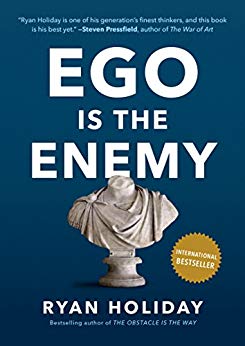
Ego Is the Enemy
This company I’m CEO of has 140 employees. I’ve grown up with this company. I was part of the original team in 2003 that started it. I’ve gone all the way until now in the same company. We’ve grown as leaders and failed over and over it again as we figure out how to make money. We lie to ourselves. We pretend we don’t have problems. We turf build. We create silo. We do all stupid things that hurt the business and prevent us from growing and doing what we need to do. Getting rid of that behavior or being vulnerable and admitting, “I wet the bed there. I totally messed up. This is the outcome. I want to share that with you as a team so that you don’t make the same mistake I did. Let me fall on the sword here,” people love that. If people are more willing to say, “I need help here. I’m not the right person for this position. I need to bring somebody in,” we can start moving forward. If I had learned these lessons several years ago, I’d be well-off. I’m not as well-off as I wish I was.
The point is there’s no way you would have understood that unless you went through the experience to be aware of it.
I beat myself up. In hindsight, “I should have done this, this and this or I could have executed this turnaround quicker if I would have done this, this and this.” It’s unfair for others and for myself to beat yourself up over that. There’s a lot of could-haves and should-haves. I wish I learned the lessons quicker so I could be better and faster. A quote came to my mind. I like Dwayne “The Rock” Johnson. In my office, my favorite quote I have in a big frame wall says, “The wolf is always scratching.” He tells a story when he was young, they were in Hawaii. He was poor. They couldn’t meet their rent and the landlord was always coming in to knock on the door and ask for the rent. They were close to eviction all the time. He’s done well now, but he’s taken that same fear and used that as a weapon or as motivation in his life to never ever take his foot off the gas, to stay hungry. He says, “The wolf is always scratching.” That means somebody’s always trying to knock him off his horse. Someone’s always trying to beat him, be the next best actor, beat him in this role or that role. He’s like, “You have to stay on edge, hungry, competitive.” In my company, we use the word 212. You have to keep it at 212. That’s the boiling point of water. It’s that extra degree of intensity that allows you to be super competitive and hard to beat. If you’re an entrepreneur, you’ve got to keep that edge somehow.
This is from a principle standpoint. Everyone wants to be successful. It’s naturally ingrained in us. It’s not this one-time event. It’s something that happens over and over. Once a person gets to one point, they may achieve something but they’re still thirsty for the next achievement and the next one. The sooner you’re aware of that, the much easier the path is going to be. The point of me explaining that is entrepreneurs don’t have to mean to start a business. It doesn’t mean that you have to go out on your own. It doesn’t mean you have to build a team. It’s also important to understand that it’s desiring to be successful and knowing that it’s okay to be successful, but success isn’t the same for everyone. How, in your business, have you helped employees feel that sense of success? What I’ve discovered is everyone has specific talents and strengths. We’re all different. Every human being is different. As you discover those, as you become aware of those, especially as an employer, as you align the role and responsibility of employees to those strengths, that’s where you tend to have the most amount of happiness and success. My question to you would be, what are some of the ways in which you’ve discovered your own strengths and pinpointed those and focused your role and responsibility around that, but also for employees?
I’m not a TV guy. I try to read as many books as I can get my hands on. I notice you have a nice library. I read a ton of books. I try to get as much knowledge as I can from people that have already gone down this path and hear from their failures, their successes. I try to adopt some of those things. That’s one thing. I made the plunge and engaged with coaches and consultants, mentors. I have some mentors that don’t charge me anything but have been kind enough to take me under their wing and give me pointers. I try to meet frequently with them and have candid conversations with me in what my personality type is like and where my roadblocks are, what I can’t see exactly as clear as I need to.
I pay for a coach that gets into all my business and helps me understand and interviews my network and figures out, “This is what you think your problems are. This is what the people closest to you think your problems are, including your wife. You’re lying to yourself if you think this isn’t true.” That’s a hard pill to swallow, but you want to experience growth. That’s what you have to do. You have to be willing to work on yourself harder than you do at any job. Hopefully, in that process, you recognize what you were born to do, what are these natural strengths that you don’t have to work that hard at developing, and stay in that lane as much as you can. There are a lot of guys that have written a lot of books that are way smarter than me. I’ve read that over and over again, but it didn’t sink in until the coach is analyzing your personality profile and reviewing what your peers or your network are telling you.
Be willing to work hard and sometimes long in the beginning. Later on, you can balance things correctly. Click To TweetYou’re like, “I need to stay in this lane and I need to delegate. Even though I can do this person’s job better or do that same role better than they can, I have to discipline myself to step out and be okay with them doing it their way and stay out of their way.” As much as that’s hard for me because I want to coach them and tell them how to do it and follow up and repeat myself over and over again. It does no good. They have to do it themselves their way. If they are interested in your opinion, they’ll ask. Otherwise, you probably shouldn’t offer your counsel until they’re ready to listen. That’s what I’ve done. You’ve got to work on yourself, become aware of where you’re supposed to do, your strengths and then stay in that lane as much as possible and supplement the other parts with good people, attract the best people in each of these different marketing, sales, operations and finance and get them what they need and stay out of their way and support them.
Have you ever heard of John Boyd? He’s one of those early personal development business guys. He was a Vietnam War pilot. He had this business theory called OODA Loop. It’s a feedback loop. OODA is an acronym. It stands for Observe, Orient, Decide, Act. The observation comes from the feedback. In war, what he would do is he’d observe all the feedback that’s coming at him, whether it’s instruments, whether it’s where the planes are. Orient himself as it relates to what’s going on in the environment, make a decision on what to do, act and keep on repeating it. The idea is most people hate feedback. They’re afraid of what they’re going to look like if the feedback isn’t good. At the same time, feedback is feedback. If you get that feedback, you’re able to orient yourself appropriately and then make a decision and act and continue to do that.
Oftentimes, we’re our own feedback. We lie to ourselves. We say things are better than they are. We say, “I’m good. They’re not. It’s their fault, not mine.” We don’t take responsibility. There are some human tendencies there. As it relates to employees and feedback, everyone does a job and they get results from that job. I have discovered that there is a way to help a person understand that there are strengths and good about them and that their level of happiness and success and fulfillment is when they’re doing what’s in that zone the majority of the time. The only way they can discover what those strengths are is by taking assessments. I’m not sure which ones you’ve done in the past. There are a million of them out there: Myers-Briggs, StrengthsFinder, Gallup. There are ways in which we can discover things about ourselves and look to the past and get the feedback. The sooner we can accept the feedback and the sooner we can accept that there are a lot of things that we could do but there are only a handful of things that we’re good at. Those good things will align with our happiness and success, the sooner you do that, even before you become an entrepreneur and do your own business, discovering that is going to give you what all the stuff that you’re looking for anyway.
In the end, it’s like, “Is it a pile of money that you want? Are you willing to sacrifice 30 years of unhappiness to get a pile of money so that you can be happy? Is it figuring out a way to be happy right now and be successful right now?” That’s one of the feedback I got from a listener was in relation to the definition of wealth. She was referring to Dave Ramsey. His programs and people are wealthy at the end of these programs. They didn’t go on vacation. They drove a five-year-old Camry for many years. They took the bus and sat next to smelly people. They vacation at the Holiday Inn. They sacrificed all the happiness to have wealth, which is a pile of money. I don’t think that’s wealth. Having a great experience, doing what you love and being happy in doing that is the true measure of a successful entrepreneur. It’s utopia-ish. That’s not realistic, but the reason we’re doing this season is that everyone has the drive to be successful, to achieve wealth, to achieve those levels. The sooner they can understand the principles behind it, the sooner they’re going to be able to take some action and get some results.
Figuring out that why like, “What it is you were born to do? Who are you supposed to become? What drives you to the deepest levels of happiness?” each individual person’s going to have to ask themselves those questions and seek those answers. I’m in the middle of my journey, so I don’t have much to say on that. I’m more aware now than I was even several months ago in thinking about those bigger deeper questions. I’ve got teenagers in my house. I’m turning 40. I have some years left and I want to accomplish some things. I want to be successful. I thought I wanted this pile of money, but I realize that a pile of money doesn’t do much. I’ve got money and it doesn’t give me the fulfillment that I thought it would. What is it that I want to do with the strengths and with the time I have? How do I give back? How do I create jobs and bless other people’s lives?

Successful Entrepreneur: You go to work on yourself, become aware of what you’re supposed to do and your strengths, and then stay in that lane as much as possible.
I’ve got mentors and coaches that have more years of experience, more financial independence than I do. I’m listening to their philosophies carefully and trying to decide what mine will be. It’s a cool journey. I enjoy the ride. It’s fun. Anybody that wants to start a business and go through it, even if it doesn’t work, it’s still an awesome experience. As long as you are responsible with that risk and you’re not putting your family’s life in jeopardy and you have a side hustle or side business that may grow into something bigger, then go for it. That’s great.
That’s part of the growth cycle.
You’re in America. It’s the best place in the world to do that. You might as well take advantage of where you were born and the opportunities and access to capital here and do something.
Let’s end with some of your favorite books that have inspired you, aside from my book. I’ve told the story before of a good friend introduce me to Rich Dad Poor Dad. That was you. You told me, “You need to read these two books.” It was Rich Dad Poor Dad and Millionaire Next Door. I read them both. I was like, “I like this one. This one sucks. I don’t want to drive some 1975 Chevy for the rest of my life.”
I was the opposite. Kiyosaki and his stuff, it was great. It helped shape my way of thinking. In a different life, I should have been an investment advisor or wealth manager. I enjoy personal finance and studying the strategies. I’m self-taught. That’s why Millionaire Next Door and Millionaire Mind hit me hard. I was like, “I could do that.” I grew up blue-collar. I didn’t have everything handed to me. I’m self-made. I connected a lot with the real millionaires in America and identified with that. I said, “I can live this way but be comfortable and make sure I’m investing and saving and building assets so that I can have fun, live life and be happy along the way, but also accumulate a bunch of wealth.” I do love that book.
Create an environment of respect where you treat people how you want to be treated. Click To TweetAt different phases of my career, different books have impacted me. When I first became CEO in 2011 or ’12 of this organization, we had gone through a tough situation. I was thrown into this massive adversity. I read the Zappos book, Tony Hsieh and his group, Delivering Happiness. I was creating a culture in a business. His culture was awesome. I tried to duplicate some of his things. That book had a big impact on me for a number of years. Ready, Fire, Aim is a sales book. It taught me how sales is the lifeblood of any business. If you’re going to get anything right, get sales flying through the door. Revenue buys you time to fix operations. I came from sales. I started in sales. I had a passion for sales. I was trying to teach myself how to be a CEO, which is a challenging transition. I’ve taken that to this company and to the other companies I’m involved with. I don’t care about all the other stuff until sales is like, “Don’t mess with their juju. Get them their comp plans. Get them in a good place where they’re bringing revenue in.” That book hit me at the right time.
Michael Masterson is the author. I told the story in the book where I worked with one of his companies. I told the story when I first met him and my experience in his office in South Florida. He’s an amazing business person. That’s a powerful book, Ready, Fire, Aim.
I read all the Tony Robbins books, all the Dave Ramsey books, including his last book, where he talks about the last step, “Once you pay your house off, this is how you build your legacy.” I enjoyed that book. Brian Tracy and his books are always good, the mindset books.
What do you consider are some of your driving business principles? A driving business principle could be courage. It could drive or tenacity. It could be customer first. As you’ve looked at the evolution of your business, what do you consider are some of those top principles?
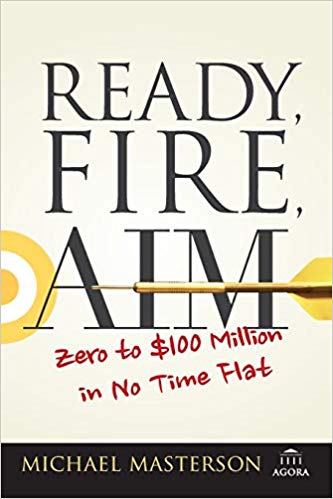
Ready, Fire, Aim: Zero to $100 Million in No Time Flat
At Orbit, this company I work for, we have what some people call a credo or your core values. Deciding that upfront is a huge part of it. The words that we have on ours tell you who we are and how we think. 212 is one of those little words on there. You have to be willing to work hard and sometimes long in the beginning. Later on, you can balance things correctly. You’re taking care of business at home so you can take care of business at work and be your best without distractions. That’s important. It’s coming together as a team and creating an environment of respect where you treat people how you want to be treated. In our company, we don’t use bad language. We’re conservative. We don’t yell at each other. We have crucial conversations, but we try to have a high level of respect so that they will pour their heart into the business. It’s a win-win for both the employee and for the management team and the company. That’s another one, continuously improving.
There’s this guy I studied for years. Jim Rohn is his name. He had ingrained in my head to work harder on yourself than you do at your job. We have continuous improvement. We want to continuously work on ourselves, knowing that there are better ways of doing everything we do. We haven’t discovered them yet. Every year, we find more and more nuggets that we should have found much sooner that would’ve allowed us to monetize our ideas so much quicker but we didn’t. It’s that culture of continuous improvement and getting people comfortable working on themselves and not sensitive about it or not willing to do it like, “That’s hard to do.” If you can create that culture, your business can evolve quickly. Those are a few that come to mind.
In the beginning, if you’re a startup, you’ve got to hustle. You’ve got to bootstrap. You’ve got to work extremely hard until you have enough contracts, enough cash coming in the door, and then you stabilize things. You work on efficiencies. Jim Collins books. Those are other books that had a big impact at a certain period in my life or How to Win Friends & Influence People. Those ones come to mind. They’re classics. You’ve got to read the Covey books. You’ll crank the efficiency. You’ll squeeze that wrench and become more efficient over time, but you got to hustle in the beginning.
The hustle comes first. The efficiency, there’s never an end to it.
The last thing that I feel important to say is the best leaders that I’ve been around have this arrogance about them. They also have this humility where they realize that they need to get people around them and they need to stay in their lane. I’ve learned that these last few years as we’ve failed in a lot of different areas. We tried things and fell on our face. It did not work. I go before my team and say, “It was an awesome, valiant effort but a bad decision. It’s my bad. My tail is between my legs. Let’s course correct and go a different way.” You’ve got to be okay with that. Some of my most successful partners in some of my businesses, you’ve got to learn from them, ask them questions, take their strengths and shorten your learning curve so that you can be more effective quicker. Instead of trying to learn it yourself and trial and error every single time, you’ve got to shorten that gap with better people around you. Get your network where it needs to be.
We’ve talked extensively about this over the last few years. There’s a turning point in business. When you look in others, you look more for their failures then you look for their actual wins, not from competition or, “You failed, therefore you’re not relevant.” It’s the lessons that can be learned through somebody going through failure that is profound. You taught me through some of the stuff that you did about certain insurance that you can get for these events that could protect you here would save me in a few different areas. I now look for where people fell short and what they did because of that and where they succeeded. You don’t know what you don’t know. Leverage comes in many different forms. One of the best leverage, especially for entrepreneurs and business owners, is that you look where others have failed massively who came back. You don’t want to find the people that failed and gave up. You want to find the failure where they came back and why, what did they learn, what were those lessons.
We can continuously work on ourselves, knowing that there are better ways of doing everything we do. Click To TweetThey were humble enough to share those with you. That’s why these mastermind groups and these groups come together, you can learn from people that came back, beat the odds and now are sharing their story and helping other people. That’s where I’m at in my career. I’m trying to surround myself with these winners that can help me avoid some of the mistakes. At this size of my company, I’m trying to scale it to the next level. Utah is cool. There are a lot of good entrepreneurs here, a lot of people that take big risks. There’s learning. It’s energizing. It helps me keep my saw sharp and stay hungry and remember the wolf is always scratching. Any success I’ve had, it could go away quickly. I need to keep pushing and taking the punches, moving forward. Hopefully, at the end of the day, I’m happy and loving life and doing what I want to do.
You did a great job for your first show.
I’m grateful that it’s done and behind me. In the next one, I promise I will be more prepared and hopefully say something that’ll help your readers.
We’ll have you on again for a second one.
Thanks for having me.

Successful Entrepreneur: Surround yourself with winners that can help you avoid some of the mistakes.
Thanks for reading. Thanks for participating in this season. We’ve had some guests that are in different fields and different positions of life, talking about more of the philosophical points of entrepreneurship. This is a practical show. In the coming ones, we have some cool guests. Both of Milton Friedman’s sons will be on. Milton Friedman was the Founder of the Chicago School of Economics and wrote a lot of books in relation to freedom and capitalism that play right into the idea of entrepreneurship. This season is going to be awesome. I hope you can take what you’re reading and apply that, even if you’re out of business or working for somebody else. Apply some of those principles and taking action on that, whether that’s discovering more about you, whether that’s understanding the importance and dynamics of relationships, especially professional relationships. I hope you got some nuggets of wisdom. I can’t wait for what you have in store for the remaining episodes of our seasons. Thanks for your support. Brandon, thank you. We’ll see you in the next episode.
Important Links:
- iTunes – The Wealth Standard
- Patrick@PatrickDonohoe.com
- Orbit Medical
- E-Myth
- Ego Is the Enemy
- The Obstacle Is the Way
- Myers-Briggs
- StrengthsFinder
- Gallup
- Dave Ramsey
- Rich Dad Poor Dad
- Ready, Fire, Aim
- Jim Rohn
- Jim Collins
- Stephen Covey
- The Hard Thing about Hard Things – Ben Horowitz
- Shoe Dog – Phil Knight
- Millionaire Next Door & Millionaire Mind – Dr. Stanley
- The Legacy Journey – Dave Ramsey
- How You Will Measure Your Life – Clay Christensen
- Extreme Ownership – Jocko Willink
- Million Dollar Habits – Brain Tracy
- How To Win Friends & Influence People – Dale Carnegie
- Delivering Happiness – Tony Hsieh
- Business Owners Guide to Financial Freedom – Mark Kohler
- https://www.OrbitMedical.com/
- https://www.LinkedIn.com/in/brandon-bliss-ba224b/
About Brandon Bliss
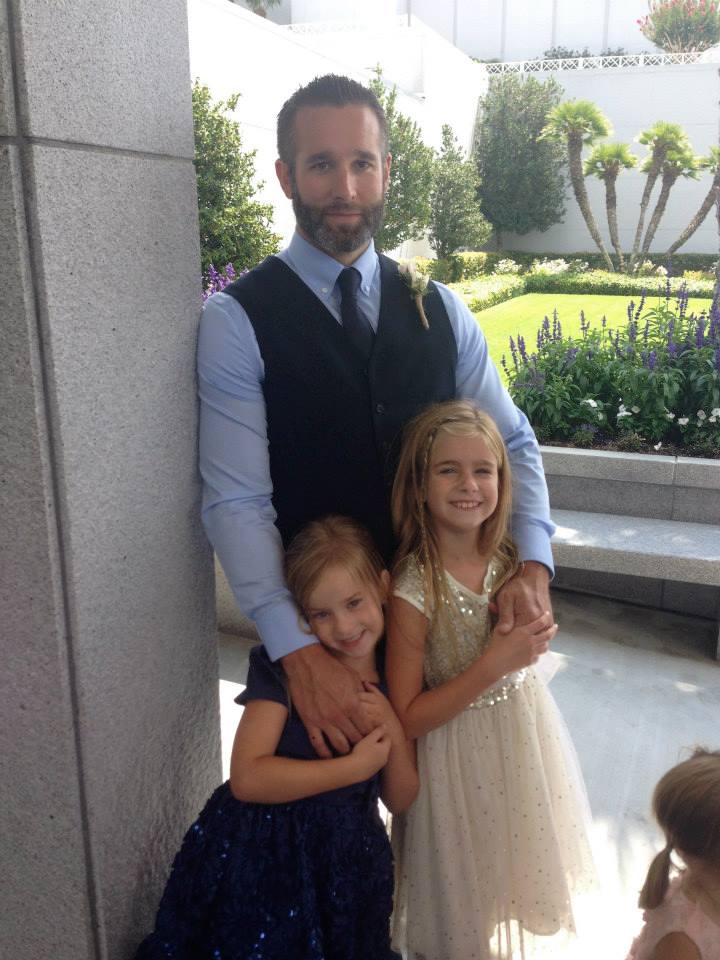 Brandon Bliss is President and CEO of Orbit Medical, a large home medical equipment company. He started with the company as an entry level sales representative and was made partner after only two years. He has been the President and CEO since 2011. Brandon has extensive experience in start-ups, business management, project management, employee development, recruiting, sales, and operations. In his current role, he works with every department of the company as they continue to expand and open new Orbit Medical offices across the country.
Brandon Bliss is President and CEO of Orbit Medical, a large home medical equipment company. He started with the company as an entry level sales representative and was made partner after only two years. He has been the President and CEO since 2011. Brandon has extensive experience in start-ups, business management, project management, employee development, recruiting, sales, and operations. In his current role, he works with every department of the company as they continue to expand and open new Orbit Medical offices across the country.
Brandon lives in Salt Lake City with his wife and their five children.

